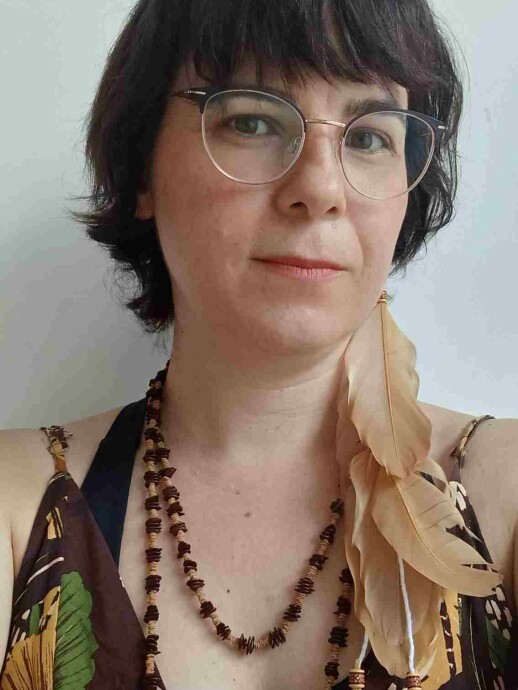
Marianna
Birmoser Ferreira-Aulu
Areas of expertise
Biography
Doctoral Researcher, Project Researcher and Teacher in the Master´s degree programme of Finland Futures Research Centre (FFRC)
Member of the following groups and networks:
- UTU´s Amazon Research Team
- UTU´s Global South Network
- Sustainable Futures Research group at Finland Futures Research Centre (FFRC)
- Activist Research Network of Finland
Hi! I am Marianna Birmoser Ferreira-Aulu, doctoral researcher at the University of Turku (UTU), Finland. My long-term professional goal is to contribute to society by exploring innovative pathways towards just and sustainable futures. I intend to do this by producing high-quality scientific materials, by popularizing science to catalyse positive transformations, and by engaging with the civil society to collaborate with various stakeholders.
My current research, with a working title of “Amazonia 2040: Scenarios of the Future for Empowering Sustainability” aims at experimenting on co-creating mapped-based scenarios. As a study case, I look at the Mosaic of Conservation Areas of the Lower Rio Negro, in the Brazilian Amazonia.
I also teach the course Futures Case Evaluation, at the Master´s degree programme of Futures Studies.
At UTU, I have worked as project researcher Finland Futures Research Centre (FFRC), and the Centre for Collaborative Research (CCR). I have been engaged with various projects in strategic foresight, futures literacy, sustainability and climate action, renewable energy, food research, and international collaboration.
In addition to desk research, I enjoy doing workshop facilitation (have experience in Finland, Peru and Colombia). I have also been quite active in public speaking, by giving talks in various seminars and conferences. I also enjoy cooperating to developing the strategy of our own organization. I have represented UTU in international cooperation initiatives through international education services.
List of projects & events Marianna has been involved in FFRC (2017-)
- Longtermism Alliance (EIT Climate Kic) [2021]
- Futures Literacy Across de Deep Demonstrations (FLxDeep) [2020]
- Manufacturing 4.0 [2019]
- European Research Intrastructures in the International Landscape (RISCAPE) [2018-2019]
- Native Crops for Innovative and Sustainable Food Futures in Peru and Colombia (HEI-ICI PECOLO) [2018-2019]
- UNESCO Chair in Learning Society and Futures of Education [2018]
- Bioeconomy and Justice (BioEcoJust) [2018]
- Green Economy Transitions in the Least Developed Countries: Multi scale Analysis of Energy and Forest Use in Laos and Cambodia (GET-LDC) [2017]
- Futures Fair – Celebration the 25th Anniversary of FFRC [2017]
- “Futures for Food” Academic Conference - 15th International Conference of the Finland Futures Research Centre and the Finland Futures Academy, University of Turku [2013]
Teaching
FUTS3115 FUTULAB5 Futures Case Evaluation [2022, 2023]
Responsible Teacher.
This is an obligatory course of the Master's Degree Programme in Futures Studies
FUTS3106 FUTUS6 Cultural Sustainability [2021]
Course assistant. Responsible teacher: Dr. Katriina Siivonen
This is an optional course of the Master's Degree Programme in Futures Studies/ Sustainable Development minor.
Research
Summary of my doctoral research plan (2021-2026)
Amazonia 2040: Constructing Images of the Future for Empowering Sustainability
Amazonia 2040 – tutkimus kestävää kehitystä mahdollistavien tulevaisuuskuvien rakentamiseksi
Supervised by Professor Toni Ahlqvist & Docent Gabriela Zuquim.
In this study, I look at how scenarios of the future are used in day-to-day and long-term planning in a context where vulnerable populations face governance instabilities. It has been recognized in the futures literature (Dreyer & Stang, 2013:16) that engaging in long-term governance is more challenging for vulnerable or less-resourceful societies. Those faced with immediate pressing problems related to poverty and basic security are less likely to devote resources to problems of the distant future. As a study case, I look at the Lower Rio Negro region, in the Brazilian Amazonia.
In this study, scenarios of possible futures are co-created with various stakeholders engaged in environment preservation in the Lower Negro River region, with the intention to empowering sustainability action and the resilience of the local governance.
It is urgent that scientific work aimed at understanding the decision-making processes and finding ways to increase the resilience of the forest is conducted. On the acknowledgment that future scenarios can help guide decision-making processes, and that environmental and social policies have direct impact towards the environment, in a way, this study also look at how the work we do in academia support policy makers in their long-term planning.
The objective of this research doctoral research is to investigate how images of the future are used in day-to-day and long-term planning in a context where vulnerable populations governance instability. I do this by exploring scenarios for 2040 in the Lower Negro River, in the Brazilian Amazonia
I am interested in observing how people approach the future for the Lower Negro River and learning the relations between what people think about futures with their hopes and fears; how they deal with uncertainties, and most specifically, how they use these imaginations about futures in day-to-day and long-term decision-making.
Methods
I will combine a traditional FL workshop technique, the Futures Literacy Laboratory (FLL), with Participatory Geographical Information System (PGIS), which is a method commonly used for spatial planning and information. Although some map-based approaches have been used in Futures Studies (for example the very recent publication by Lingua and Caruso 2022), approaches based on GIS have rarely been used in the field. In this study, I would like to explore potential uses of PGIS in the creation of images of the future, and potentially embedded PGIS in the FLL framework.
Keywords: Futures Studies, Conservation Biology, Political Science, Amazonia, Sustainability transformation, Interdisciplinary Studies, Sustainable Development; Scenarios; PGIS